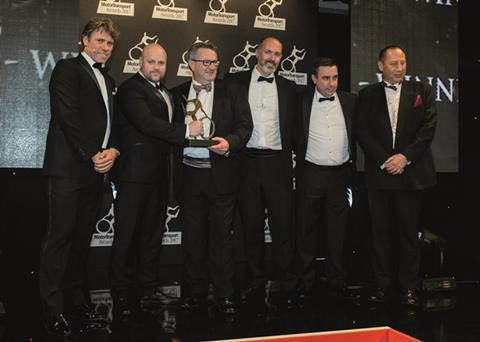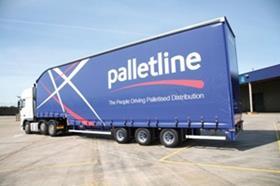
Winner of the Safety in Operation Award this year was Palletline for its exceptional attitude towards keeping its staff and customers safe.
After securing its third Motor Transport Safety in Operation award in a fve-year period, it is no surprise to discover the work it does to keep its business accident free is a great source of pride for Palletline.
At the time of writing, Palletline had achieved 516 days without having to report an accident, despite handling 20,000 pallets a day. “When it comes to safety, there’s no leeway,” operations director Richard Gutsell told MT.
“If someone’s acting unsafely it has to be dealt with. We are trying to encourage our staff to be safer before incidents happen, rather than reacting to them.”
Its Birmingham hub was designed with safety in mind. Some areas are depedestrianised with one-way systems for forklift trucks to prevent collisions. Health and safety manager Ken Bell was involved with the development of the hub and said safety was taken into consideration for almost all of its features.
“It would have been easy for us to put a painted line on the floor to mark where the drivers are going
to be standing, but a painted line doesn’t stop anything,” said Bell. “If you take human beings off the shop floor you can reduce accidents and certainly reduce the effect an accident would have on the people who are involved.”
While one-way systems for trucks are quite commonplace, Bell said such restrictions for forklift trucks are less likely. Forklift-truck use is monitored and drivers must undergo a stringent training regime
before they are allowed to operate them.
“You can’t operate a forklift unless you’ve got your seatbelt on,” Bell said. “There is fob access so nobody can just jump on a forklift truck, and if they do then we know exactly who they are.”
Forklifts also have shock sensors, which will trigger an email to Palletline’s health and safety team in the event of a collision. The forklift will be reduced to a low speed until the company can investigate the cause of the shock, and the truck must be reset before it can go back to its usual duties.
The forklift trucks are limited to 10mph, but Bell said it would be rare for a forklift to reach 10mph during busy periods. Palletline has 54 forklift trucks in operation at the hub, with about 80 drivers. New drivers are “buddied-up” with more experienced forklift operators, and all drivers are expected to pass an examination before they are able to use the equipment.
Staffing safely
The network does not use agency staff due to the high quality of work that forklift drivers have to demonstrate. Bell said: “Our testing regime is extremely hard and we do that deliberately. If you pass our
forklift-truck assessment then you have done exceptionally well. Of the last 20 people we’ve looked at, we’ve used two. There’s a massive difference between a forklift driver and the level of forklift driver we expect here. We pay good money, but we expect good drivers.”
Safety at the hub is ensured by conducting short safety audits throughout the day. These involve Bell or a member of his team spending 30 minutes walking around the site and checking there are no hazards or anything that could cause a potential issue. More detailed audits are conducted on a regular basis and reported to the board.

Bell said the 30-minute audit involves checking walkways, flooring, lighting, equipment, sweepers, forklifts and shunters, and are conducted at regular intervals throughout the day and night shifts.
“It’s an at-a-glance audit,” he said. “The problem is you can get caught up with details, and we do detailed audits, but the 30-minute daily one is to pick up things that are right in front of you.”
Being realistic
Bell said it is impossible to stay 100% accident free in the transport industry, but any accident that occurs is followed up and steps are taken to prevent it from happening again.
“You can’t stay completely accident free. Every year we say zero accidents but our auditor says that’s unrealistic. However, if you aim to have any accidents at all, then you’re defeating the objective. Having zero accidents and nobody getting hurt at all has always been the philosophy.”
Minor and major accidents, as well as near misses, are treated in the same way. The company rigorously investigates the cause of the incident and takes action to prevent it from being repeated. Occasionally staff may have to be retrained.
“We will not put anybody out into the warehouse who has not had training,” said Gutsell. “We will not call an agency worker if we are short one night; they have to have been fully inducted and tested first.”
New starters receive general health and safety training as well as training specific to their role. They are then taken on a full-site tour, going through the specifics of what is required at each point and the hazards they may encounter. They are then assessed to make sure they understand what they have learnt.
In the unlikely event of an accident, which Gutsell said only occurs when staff have failed to follow usual processes, supervisory staff on the shop floor will begin with an initial investigation and detail the type of accident; its location; whether there were any witnesses; and whether CCTV footage is available.
Bell and health and safety coordinator Liam Pegg will review the information that has been collected and will start a formal investigation to try to establish the root cause of the accident.
“Nine times out of 10 we will look to change behaviour and educate the individual involved,” Bell said. “We know they’re good people as we’ve gone through a good process of getting them in. They will learn from their mistakes.”
Depending on the nature of the incident, recommendations will sometimes be made to the operations director, HR department or shift managers. Bell said CCTV footage of incidents is often a useful training tool. Palletline is considering looking at ways of recreating a potential hazard in a safe environment to use for staff education.
He said: “We had heard a lot about vehicle rollaway; not coupling, brakes being left off, etc. We thought it could happen here and instantly we put together a best practice guide that went out to our members. We also supplied a hand-out for the drivers and we had several members ask for copies to put on their noticeboards.”
Staff awareness
Bell praised the network’s staff for being aware of health and safety issues. Staff are encouraged to be forthcoming with ideas to improve health and safety across the operation, which is often taken onboard by the company.
“We try to get the guys to look out for each other. We want them to be able to ask each other ‘what are you doing?’ if someone is acting unsafely. And they do that. The drivers need to be empowered to speak up when something’s not safe. They need training, not just for driving the vehicle, but also strapping the loads down and sheeting, for example. That all takes a great deal of skill and it needs to be appreciated that there are hazards associated with that.”
An area that attracted particular praise from the judges was the introduction of its 750kg pallet-weight limit and the corresponding Lift Assist service it offers for heavier pallet delivery.
Bell said many of the network’s customers have got onboard with the idea and all members have received their own powered pallet trucks and equipment to weigh pallets before loading them on to their trucks.
He said: “We made a decision based on our risk assessments and deliveries. It was the highest vote in favour we’ve ever received at our members’ meeting. We very much took the decision based on what our members wanted.
“A tonne is a huge amount of weight to move. It’s very heavy to push on a standard pallet truck. When was the last time you went walking on a pavement and it was a perfect floor?”
The network is careful to ensure pallets are safely loaded onto its members’ trucks and it enforces a 400kg weight limit for pallets loaded onto the top deck of double-deck trailers. It invested £125,000 in getting scales put onto forklifts to ensure this requirement is met.
“Our guys have got equipment on their forklift truck that means they know what’s 400kg or not. I don’t want our guys to get into trouble. I don’t want anybody to get hurt, and we’re protecting the drivers, the public and our members,” Bell added.
Gutsell said Palletline plans to embark on a number of other initiatives to improve safety over the next 12 months, including “Lift Assist phase two”.
Although he remained tight-lipped on what this would entail, he promised it would further enhance the safety of the network’s staff and those employed by its members.











